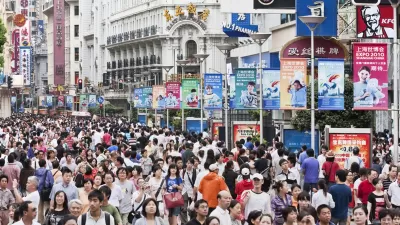The Communist Party announced on Nov. 15 two huge changes to two long-term policies that exerted enormous control over its citizens. More couples will be allowed to have additional children and "reeducation through labor camps" will be abolished.
The two moves, "issued by the official news agency, Xinhua," show that the Communist Party is choosing to give up on its "power to control citizens' lives," writes Chris Buckley. Already, the controversial one-child policy, "introduced in the late 1970s" according to Xinhua, had been changed to allow urban couples to have "two children if both parents are single children..Many rural couples already have two children, and some have more", writes Buckley.
The new policy extends the second-child policy to couples where only one spouse is an only child.
If carried through, the relaxation would be the first significant nationwide easing of family size restrictions that have been in place since the 1970s, said Wang Feng, a demographer who teaches at both the University of California, Irvine, and Fudan University in Shanghai. He estimated the policy could lead to one million to two million more births in China every year, on top of the approximately 15 million births a year now.
Buckley writes that the "one-child restrictions were introduced to deal with official fears that China’s population would devour too many resources and suffocate growth. But they have created public ire and international criticism over forced abortions, and have created a population of 1.34 billion, according to a 2010 census, that is aging relatively rapidly, even before China establishes a firm foothold in prosperity. Experts have for years urged some relaxation of the controls."
The Wall Street Journal's Beijing correspondent, Laurie Burkitt, makes clear that a major reason for the policy change was the country's looming labor shortage, which will "[put] a great strain on the nation's safety net", as mentioned in her video. But will it be enough to change the nation's looming labor crisis?
Burkitt writes that "demographers say the shift, in the document charting China's economic course for the next decade, comes too late to solve a looming labor crisis in a rapidly aging society."
[See WSJ graphs of two population projections: growth peaking in the 2020s and growing aging population].
The population and labor camp policy changes were not the only ones endorsed by President Xi Jinping on Friday. They were part of 60 initiatives "that also laid out broad and potentially far-reaching proposals to restructure the economy by encouraging greater private participation in finance, vowing market competition in several important parts of the economy, and promising farmers better property protection and compensation for confiscated land," writes the Times' Buckley.
"The system of forced labor camps that Communist Party leaders announced they're abolishing, established in 1957, allows police to imprison people for up to four years without formal arrest or trial," states PBS NewsHour's Jeffrey Brown in Part 1 of their new report on the policy changes.
However, guest Kenneth Roth, executive director of Human Rights Watch, clarifies that "China is not abolishing labor camps" in Part 2.
It's abolishing one of the means that people are put in labor camps, the so-called reeducation through labor. About two-thirds of the people sentenced through reeducation through labor are drug users.
FULL STORY: China to Ease Longtime Policy of 1-Child Limit

Planetizen Federal Action Tracker
A weekly monitor of how Trump’s orders and actions are impacting planners and planning in America.

Map: Where Senate Republicans Want to Sell Your Public Lands
For public land advocates, the Senate Republicans’ proposal to sell millions of acres of public land in the West is “the biggest fight of their careers.”

Restaurant Patios Were a Pandemic Win — Why Were They so Hard to Keep?
Social distancing requirements and changes in travel patterns prompted cities to pilot new uses for street and sidewalk space. Then it got complicated.

Platform Pilsner: Vancouver Transit Agency Releases... a Beer?
TransLink will receive a portion of every sale of the four-pack.

Toronto Weighs Cheaper Transit, Parking Hikes for Major Events
Special event rates would take effect during large festivals, sports games and concerts to ‘discourage driving, manage congestion and free up space for transit.”

Berlin to Consider Car-Free Zone Larger Than Manhattan
The area bound by the 22-mile Ringbahn would still allow 12 uses of a private automobile per year per person, and several other exemptions.
Urban Design for Planners 1: Software Tools
This six-course series explores essential urban design concepts using open source software and equips planners with the tools they need to participate fully in the urban design process.
Planning for Universal Design
Learn the tools for implementing Universal Design in planning regulations.
Heyer Gruel & Associates PA
JM Goldson LLC
Custer County Colorado
City of Camden Redevelopment Agency
City of Astoria
Transportation Research & Education Center (TREC) at Portland State University
Camden Redevelopment Agency
City of Claremont
Municipality of Princeton (NJ)



























